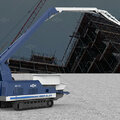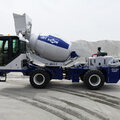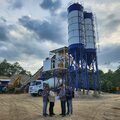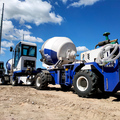A concrete pump on trailer is an essential piece of equipment in modern construction, providing efficiency in transporting and placing concrete at construction sites. It’s particularly beneficial for projects where precise placement or long-distance pumping is required. As with any heavy-duty equipment, maintaining a concrete pump on a trailer is crucial for ensuring optimal performance, preventing costly breakdowns, and extending the life of the machinery. In this guide, we’ll cover essential tips on maintaining and fixing your concrete pump on trailer to ensure it operates smoothly, efficiently, and reliably.
Importance of Reg ular Maintenance
ular Maintenance
Regular maintenance is critical to keeping a concrete pump on trailer in top working condition. The demanding nature of pumping concrete, combined with external factors such as weather, site conditions, and material quality, can lead to wear and tear. Without proper care, components may degrade, leading to inefficiencies, breakdowns, and ultimately, costly repairs or replacements.
Key benefits of regular maintenance include:
Increased efficiency: A well-maintained pump runs smoothly, improving the speed and accuracy of concrete placement.
Longer equipment lifespan: Regular maintenance helps prevent early component failure and extends the useful life of the pump.
Reduced downtime: Proactive maintenance reduces the likelihood of unexpected breakdowns, which can cause project delays.
Lower operational costs: Well-maintained pumps require fewer repairs, helping to lower long-term operating costs.
Routine Maintenance Checklist
To ensure your concrete pump on trailer is operating efficiently, a routine maintenance schedule is necessary. Here’s a breakdown of the essential tasks that should be performed regularly:
a) Daily Maintenance
Visual inspection: Conduct a thorough inspection of the entire concrete pump and trailer before starting operations. Look for visible damage, wear, or loose components.
Check hydraulic oil levels: The hydraulic system is critical for powering the pump. Ensure the oil levels are within the recommended range to avoid mechanical failure. Low oil levels can cause overheating or damage to hydraulic components.
Inspect hoses and pipes: Look for cracks, leaks, or any wear on hoses and delivery lines. Damaged hoses can lead to a loss of pressure or safety hazards at the job site.
Check lubrication points: Proper lubrication is essential to reduce friction and prevent wear on moving parts such as the pump cylinder, piston, and boom (if applicable). Ensure all lubrication points are adequately greased.
Clean the hopper: After each use, clean the hopper thoroughly to prevent concrete buildup, which can clog the pump and lead to malfunction. Use water or an appropriate cleaning solution for concrete removal.
b) Weekly Maintenance
Inspect filters: Check hydraulic and fuel filters for debris or clogging. Clean or replace them if necessary to maintain the system’s efficiency.
Grease bearings and joints: Bearings and joints that are frequently in motion require regular greasing to prevent wear and failure.
Check the pump's wear plates: The wear plates inside the pump are prone to degradation over time. Inspect them weekly and replace them as needed to maintain optimal pumping performance.
c) Monthly Maintenance
Inspect hydraulic system: Examine the hydraulic system in more detail for any leaks, unusual noises, or irregularities. Ensure the hydraulic pump, valves, and cylinders are functioning properly.
Check tire pressure: Since the pump is mounted on a trailer, ensuring the tires are in good condition and inflated to the proper pressure is important for safe towing.
Test electrical components: The control panel, sensors, and switches should be tested to ensure that all electrical components are working correctly.
d) Yearly Maintenance
Comprehensive inspection: Perform a thorough inspection of the entire concrete pump on trailer, including the chassis, axles, brakes, and hydraulic systems. Any components that are near the end of their service life should be replaced.
Fluid changes: Hydraulic fluid, engine oil, and other essential fluids should be changed annually to maintain performance.
Common Issues and How to Fix Them
Even with regular maintenance, issues can occasionally arise with a concrete pump on trailer. Here are some of the most common problems and solutions:
a) Hydraulic System Failure
The hydraulic system is at the heart of a concrete pump. When it fails, the pump can lose power or stop working entirely.
Symptoms:
- Slow or jerky operation of the pump.
- Unusual noises from the hydraulic pump or motor.
- Overheating or leaking hydraulic fluid.
Solutions:
Check hydraulic oil levels: If the oil is low, top it off to the recommended level.
Inspect for leaks: Look for any visible leaks in hoses, connectors, or cylinders. Replace damaged components as necessary.
Change the hydraulic filter: A clogged filter can restrict fluid flow, reducing system efficiency. Replace the filter if it’s dirty.
b) Pump Blockages
Blockages occur when the concrete pump becomes clogged with hardened concrete or debris, preventing the smooth flow of concrete through the system.
Symptoms:
- Reduced output or inconsistent flow of concrete.
- Unusual pressure buildup or noises in the pump system.
Solutions:
Clean the pump regularly: Ensure the hopper and delivery lines are cleaned after every use to prevent the buildup of concrete.
Use the right concrete mix: Ensure that the concrete mix you’re using is suitable for pumping. Too dry or too thick a mix can lead to blockages.
Reverse the pump: Many pumps come with a reverse function to clear blockages. If this fails, you may need to manually clear the blockage by dismantling the hoses and pipes.
c) Wear and Tear on Pistons and Seals
The pistons and seals in a concrete pump are subject to wear over time, especially when dealing with abrasive materials like concrete.
Symptoms:
- Loss of pumping pressure.
- Leakage around the piston seals.
Solutions:
Replace worn seals: If the seals are worn or damaged, they should be replaced immediately to prevent further damage to the pump.
Check piston condition: Inspect the pistons for signs of wear, and replace them if necessary. Regular greasing of the pistons can prolong their life.
d) Electrical Failures
Electrical components such as sensors, control panels, and wiring are crucial for the operation of the concrete pump. Faulty wiring or malfunctioning sensors can lead to pump failures.
Symptoms:
- Pump not responding to control inputs.
- Inconsistent operation or sudden stopping.
Solutions:
Check connections: Inspect all electrical connections for looseness or corrosion.
Test sensors and switches: Ensure that all control sensors and switches are functioning correctly. Replace any faulty components.
Examine the control panel: Look for signs of damage or wear in the control panel. If necessary, have an electrician diagnose and fix any issues.
Preventative Measures
In addition to regular maintenance and quick fixes, there are several preventative measures you can take to ensure the longevity and reliability of your concrete pump on trailer:
Training: Ensure that operators are fully trained on how to use the concrete pump properly. Misuse or improper operation can lead to premature wear and mechanical failure.
Proper storage: When not in use, store the pump in a dry, covered area to protect it from the elements, especially if working in harsh environments with high humidity or salt exposure.
Timely repairs: Address any issues as soon as they arise to prevent them from escalating into more significant problems. Small repairs done early can save time and money in the long run.
Maintaining and fixing a concrete pump on trailer is crucial for ensuring its optimal performance and extending its lifespan. By following a regular maintenance routine, addressing common issues promptly, and adopting preventative measures, you can keep your pump in excellent working condition and avoid costly repairs or downtime. From daily inspections to yearly fluid changes, every step in the maintenance process plays a vital role in keeping your concrete pumping operations running smoothly and efficiently.





